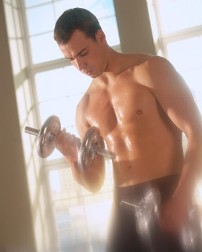How to Replenish Electrolytes
in the Body After Exercise
Note: As an Amazon Associate I earn from qualifying purchases.
I find that most people know iit is important to replace electrolytes in the body during and after exercise, especially for high-intensity workouts or endurance events.
However, many don’t really understand what electrolytes are or how to replenish them.
In fact, the balance of electrolytes in the body is critical for optimum function of all of our cells, tissues, and organs.
Electrolytes are electrically charged minerals in the body.
The top three electrolytes found in the highest concentration are sodium, potassium, and chloride.
Other key electrolytes in the body include calcium, magnesium, phosphate, and bicarbonate.
How Your Body Uses Electrolytes
Your body uses electrolytes to help with nerve and muscle function. Both of these functions are obviously essential for any type of exercise, especially sports training and performance.
Electrolytes are found in the blood, urine, and other bodily fluids (both within the cells and surrounding the cells). They help to regulate the acid-alkaline balance as well as fluid balance in the body.
For example, to adjust fluid levels, the body can move electrolytes in or out of cells. If the electrolyte concentration is low, the body will move fluids out of that area.
If the concentration is high, it will direct more fluid to that area. The kidneys also play an important role in maintaining electrolyte balance.
Electrolytes Are "Lost" While Exercising
The body loses electrolytes (especially sodium) during exercise primarily through sweating. The most important electrolytes lost during intense exercise and endurance activities are sodium and potassium.
When electrolytes are low in your body, muscle and nerve function will be impaired. Or you might start to feel dizzy or nauseous.
In mild cases of electrolyte loss, you may not “feel” any symptoms at all, but the imbalance will still affect your performance and recovery.
You may think you just had a “bad workout” or did not “get enough rest.”
In addition, having low electrolytes will cause a much slower repair of muscles and tissues.
In extreme cases of electrolyte loss, such as when running a marathon in hot weather without proper hydration and electrolyte replenishment, one may develop water intoxication or hyponatremia.
Even though these conditions are rare, they are serious and can lead to severe headaches, seizures, coma, even death. A medical professional should always be consulted with severe symptoms.
6 General Guidelines for Replenishment
The need for fluid and electrolyte replacement depends on many factors, including (but not limited to) exercise duration and intensity, outdoor and/or indoor temperature, and the rate at which you lose water and electrolytes.
The following are general recommendations for replenishing electrolytes in the body lost as a result of exercise:
- In most cases, drinking mineral-rich water will be sufficient to maintain electrolyte balance when exercising moderately for less than 60 minutes.
- When exercising for 60 minutes or more, drink at least 12 ounces of an electrolyte replacement drink (with added sodium and glucose) every half hour.
- Also drink an electrolyte-replacement drink for high-intensity and hot-weather activities lasting more than 30 minutes.
- Reduce your intake of sodium in general. This will actually increase your body’s ability to retain sodium during exercise.
- Increase your intake of fresh fruits and vegetables daily to increase your potassium levels.
- Drink at least half your body weight in ounces of mineral-rich water throughout the day for stay properly hydrated. For example, if you weigh 190 lbs, you would want to drink a minimum of 95 oz. (about 3 liters).
Note: Elite athletes will need to refine these guidelines and become a scientist in his/her own body.
Coaches, trainers or nutritionists who specialize in your sport can help you develop an individualized hydration and electrolyte replacement program based on keen observation and testing.
Further reading . . .
Benefits of Switchel - A Healthy Electrolyte Beverage
Return from Electrolytes in the Body to Proper Hydration for Sports and Fitness
If you would like to reproduce or republish this article or any other article on this site, feel free to do so but please include a reference or link to the article at WaterBenefitsHealth.com.
Sign Up for Our Monthly
Newsletter
Visitor Comments
"This was the best and most straight forward info on the net yet. I asked a question and got an answer that made sense. Thank you so much!" - Linderlinder
FINALLY!!! I have been wondering about this for years with no 'solid' answer. This is exactly what I've been wanting to know! Thank you for this share..." by Andy
"Thank you for the information, Nancy. I appreciate it. Your article and findings are very helpful, referring to dehydration." - Carolyn
"Lemon water is one drink both my wife and I can't drink. It upsets our stomachs. We are in our sixties and in very good health—well, better health now that we drink about 2 liters plus of water each day. It has made so much difference to our digestive systems and recovery every day. Thank you for your website and effort." - Rod



